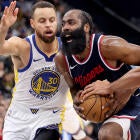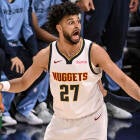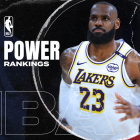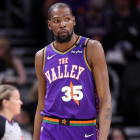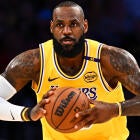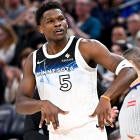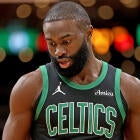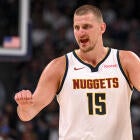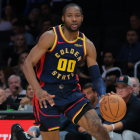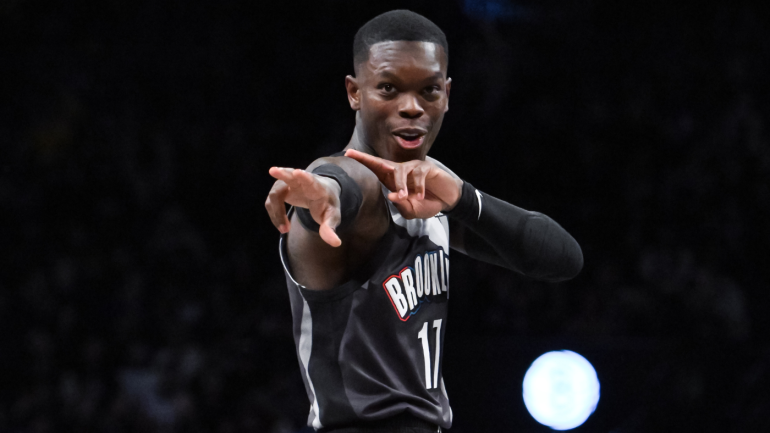
The first meaningful trade of the the 2024-25 NBA season has arrived. The Golden State Warriors have finalized a trade with the Brooklyn Nets to acquire point guard Dennis Schroder. The Warriors sent De'Anthony Melton, who is out for the season due to an ACL injury, to Brooklyn along with guard Reece Beekman and three second-round picks to get Schroder to serve as Stephen Curry's backup moving forward. Golden State also picked up a second-round draft pick.
Golden State's acquisition of a high-end reserve is notable in and of itself, but the deal is meaningful as much for what it says about the long-term plans both teams are mapping out ahead of February's trade deadline. So let's grade this deal for both sides and attempt to figure out what it means for the Warriors and Nets moving forward.
Golden State Warriors: B
Schroder fills about as clear a need for Golden State as any hopeful contender has in the NBA this season. The Warriors simply cannot score when Stephen Curry goes to the bench. Their offensive rating falls from 119.1 to 101.7 whenever Curry is not on the floor, and their net rating dips by 12.8 points per 100 possessions without him. The roster as a whole lacks overall scoring punch. Curry is its only 20-point scorer, and while Andrew Wiggins has impressed with 17.2 points per game, he has gotten there with 3-point shooting numbers that may not be sustainable. With Brandin Podziemski failing to develop as the Warriors surely hoped, Golden State simply needed somebody else who could put the ball through the net.
Schroder can obviously do so. He's averaging a relatively efficient 18.4 points per game this season, and his time with LeBron James on the Los Angeles Lakers was proof that he is capable of functioning just fine without the ball in his hands. That will be essential for a Warriors team that plays a fairly egalitarian offense. Also notable: Schroder, who notoriously struggled to successfully utilize screens in pick-and-roll earlier in his career, has improved dramatically on that front this season. He is not just an isolation scorer anymore, and the defense he played on Curry in the second round two postseasons ago likely helped convince Golden State that he can help them on that end of the floor as well.
In terms of basketball fit and price, this is a pretty clear win for the Warriors. They filled a need without giving up an essential part of their rotation or a first-round pick. So why a "B" instead of an "A?" It's simple: opportunity cost.
The Warriors have been star-hunting since at least the summer. They missed out on Paul George and Lauri Markkanen during the offseason, but have been linked to Jimmy Butler lately and surely would have explored any other big name to become available during the season. They obviously still can, but Melton's expiring, mid-level contract would have been a very valuable tool for salary-matching in such a deal. The Warriors don't have a spare $40 million contract lying around as they did with Chris Paul a season ago. If they make a big trade this season, it is going to mean combining three or four salaries to get one back.
The Warriors have the contracts to do that, but Melton's was so important because his injury meant that he could no longer help them on the court. All of their contracts at this point are attached to meaningful players. Would you give up, say, Wiggins, Kyle Anderson and Jonathan Kuminga for Jimmy Butler? Sure. But that means giving up some of the depth that Steve Kerr has relied upon this season. Was getting a good reserve now worth making it harder to get a star later? Potentially. It depends on what kind of star deals are out there at the deadline and how helpful Schroder turns out to be, but the timing matters here. Golden State gets its help in December. Its contending contemporaries will likely have to wait a little bit longer. In a loaded Western Conference, the extra few wins that could create might make all of the difference.
Brooklyn Nets: B
If the Nets had made this trade in February, it probably gets a "C." Schroder has been arguably Brooklyn's best player this season. He's on an affordable contract, and three second-round picks isn't a great haul from a Golden State team that doesn't tend to pick very high in the draft. Remember the 2023 trade deadline, when basically any rotation player with a pulse was netting four or five second-round picks? Schroder is better than many of those players and got less back.
But this deal wasn't about the return for Schroder. It was about Brooklyn's overall vision. The Nets traded a mountain of future draft capital from the Suns and Mavericks to the Rockets in June to get control of its own picks back in 2025 and 2026 back. When you trade for someone else's picks, the value of those picks is out of your hands. But when you trade for your own? You can control how valuable those picks are by how aggressively you tank. The price the Nets paid to get their own picks back reflected that. They paid a premium because they knew that they could tank their way up to the top of the lottery in order to justify that price.
It wasn't working in part because of how well Schroder played for them. The Nets are losing the minutes they play without Schroder by 11.1 points per 100 possessions this season, but they're actually winning the minutes Schroder plays by 0.4 points per 100 possessions. That cannot happen for a tanker. The Nets ultimately decided that waiting until the deadline to see if they could get more for Schroder wasn't worth the extra wins he would generate for them in the interim. Every loss counts on lottery night.
This is the proper approach to a rebuild. The Nets are thinking about the whole, not the individual parts, and that's potentially a signal as to how they plan to handle their other possible trade chips. They've held on to Dorian Finney-Smith and Cam Johnson longer than they probably should have, but if this is their approach this season, both could potentially be had for reasonable prices in the name of the tank.
![[object Object] Logo](https://sportshub.cbsistatic.com/i/2020/04/22/e9ceb731-8b3f-4c60-98fe-090ab66a2997/screen-shot-2020-04-22-at-11-04-56-am.png)









